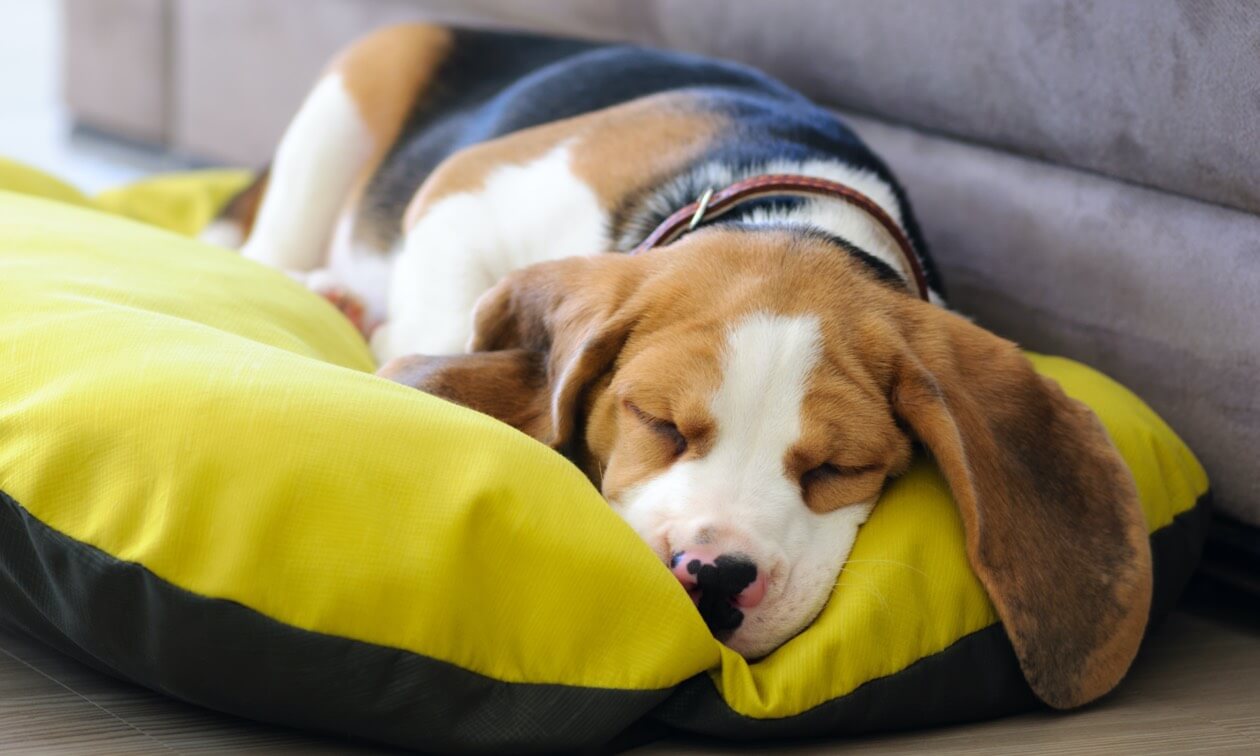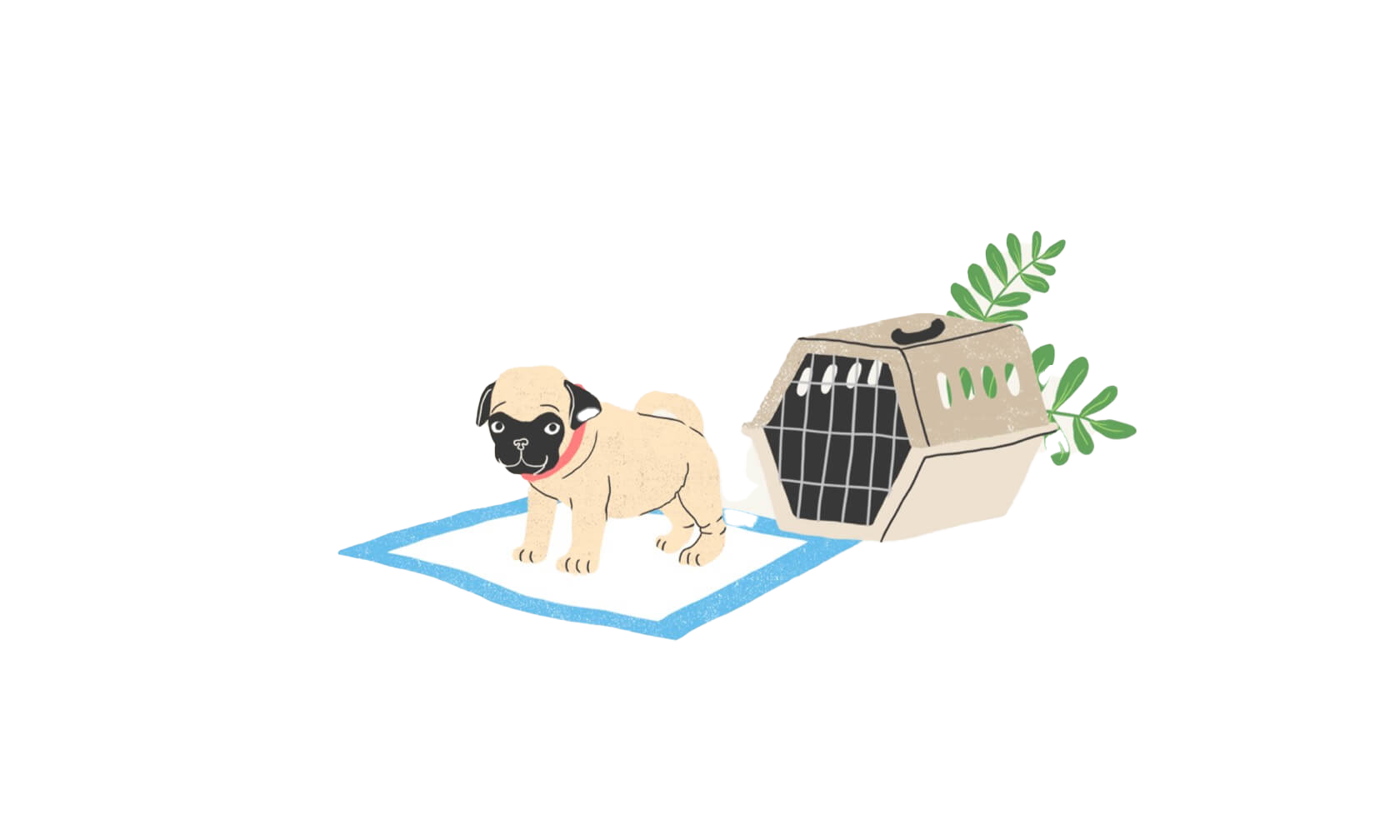Many puppies seem to have two modes: whirling dervish or fast asleep (and the transition from supercharged to super snooze can seemingly happen in an instant). A puppy’s sleeping patterns often don’t match up with our own, with lots of naps throughout the day. Your puppy may even be wide awake in the middle of the night and prefer running zoomies to settling in their crate or pen.
The good news is that a puppy’s sleep schedule will become more regular as they grow, and they will eventually sleep through the night.
How Much Sleep Do Puppies Need (and Why)?
Young puppies need up to between 18 to 20 hours of sleep a day. Getting enough sleep is crucial for puppies, both for physical development and behavioral development. Playing, exploring, and growing requires a lot of energy.
Growth happens while your puppy sleeps, which is why puppies sleep more every day than adult dogs do. As your puppy matures into adolescence and then into adulthood, you’ll notice a shift in their sleeping patterns and that they aren’t sleeping as much. Adult dogs typically sleep between 12 to 14 hours per day. Some sleep more or less, depending in part on breed and age.
Sleep is essential for immune system development, as it allows the body a chance to rest and repair. Not getting enough sleep can impact a puppy’s ability to fight off illness or recover from injury.
A puppy’s brain is processing lots of information as they learn about the big wide world. Dogs experience REM (rapid eye movement) sleep just as humans do. REM sleep gives a puppy’s brain a chance to sort through and absorb all this information and get some downtime.
How Long Do Puppies Sleep at Night?
While puppies need a lot of sleep over 24 hours, it’s normal to not sleep continuously through the night until they are around 16 to 20 weeks old. A puppy may sleep 4 to 6 hours at a time overnight, but this can vary between individual dogs. It’s also not abnormal for a puppy to start off sleeping longer through the night and then wake up more frequently or earlier in the morning as they grow.
At nighttime, puppies tend to sleep in longer increments than during the day, but their circadian rhythm is still developing. The length of time a puppy stays asleep at night is affected by a few different things:
- Their Sleep Cycle. (Light sleep, REM, and deep sleep). Dogs go through sleep cycles much faster than humans do. For example, a dog can go through 10 or more cycles in the same period as a human goes through 2 or 3. A puppy may sleep for a few cycles and then be awake and ready to go in the middle of the night.
- Bathroom Needs. A puppy’s bladder and digestive system are still developing. Any pressure or discomfort they feel may wake them up.
- The Sleeping Environment. Ambient temperature, light, sound, and whether they sleep in your bed can affect how long a puppy will sleep through the night.
- Stress Levels. Higher levels of stress affect how well a puppy sleeps and can cause insomnia. Big life changes, such as leaving their litter and moving to a new home, can impact how well a puppy falls asleep and how long they stay asleep.
- Medical Issues. Any puppy suffering from respiratory, gastrointestinal, or urinary issues can have trouble sleeping through the night. Additionally, if they are experiencing any discomfort or pain, such as from an ear infection or teething, their sleep can be disrupted.
How To Get a Puppy To Sleep Through The Night
Keep a Bedtime Routine
Having a consistent pre-bedtime routine is a nice way to help your puppy prepare for longer sleep.
A good starting place for a nighttime routine is your puppy’s dinner. You don’t want dinner to be so early that they get hungry right before they are supposed to sleep. But you don’t want it to be so late that they will wake up and need a potty break right after settling down to sleep.
After dinner, take a potty break, have some time to play or exercise to burn off excess energy, and then give your puppy a calming activity, such as working on a dog chew or toy. Right before bed, give them another chance to go potty.
Provide Appropriate Daytime Exercise and Enrichment
Getting enough exercise and enrichment during the day can help tire a puppy out for when it’s time to rest overnight. This doesn’t mean you need to keep your puppy from napping during the day. But when they are awake, giving them appropriate outlets for energy is essential to a better night’s sleep.
Incorporate safe socialization activities to stimulate their brain, sign up for a puppy training class, and rotate dog puzzles and puppy toys and chews to give them something novel to experience each day.
Create a Calm Sleeping Environment
Make your puppy’s sleeping area as comfortable as possible, depending on their preferences. Some puppies prefer soft and cozy sleeping spots, while others overheat easily, meaning less bedding is better. You’ll want to frequently check your puppy’s crate to make sure they haven’t outgrown it and wake up because they feel cramped.
Consider covering your puppy’s sleeping area with a lightweight sheet, blanket, or crate cover to block excess light. Turn on a white noise machine or fan to mask ambient noise that could wake your puppy up. White noise can be relaxing.
Many puppies find comfort in a soft toy that smells like you to snuggle up against. You can also use calming dog pheromones to encourage relaxation and calm. Another thing to consider is whether you need to move your puppy’s sleeping place closer to where you sleep at night. Many puppies wake up and become distressed when they feel isolated, so keeping them close by can provide them comfort and help them feel safe and secure if they wake up.
ZPC-02264R1
- Kinsman R, Owczarczak-Garstecka S, Casey R, Knowles T, Tasker S, Woodward J, Da Costa R, Murray J. Sleep Duration and Behaviours: A Descriptive Analysis of a Cohort of Dogs up to 12 Months of Age. Animals (Basel). 2020 Jul 10;10(7):1172. doi: 10.3390/ani10071172. PMID: 32664232; PMCID: PMC7401528.
- Why Do Dogs Sleep So Much? How Much Is Too Much? PetKeen. https://petkeen.com/why-do-dogs-sleep-so-much/ Accessed October 13, 2022



